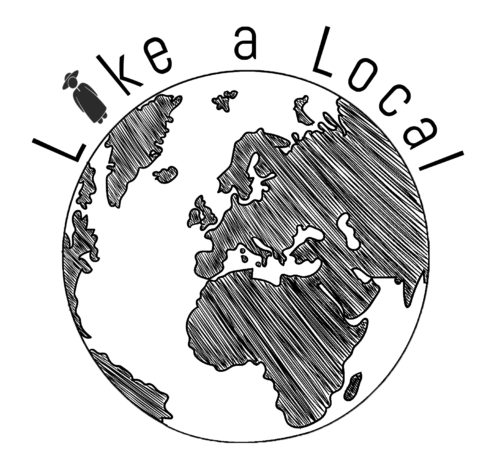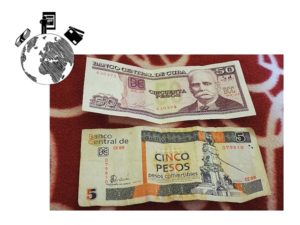What’s on this page?
Find here some useful tips and advice when travelling around the world to help you manage your money and avoid extra fees when using different currencies.
Travel Money Advice page content:
- Debit Cards/Credit Cards
- Two Cards to Load
- ATMs
- Money Transfer Services
- Cash
- Like A Local
- World Regions Tips
Debit Cards/Credit Cards
Quite a few travel websites (US ones for many of them) talk about some great deals with credit cards, blablabla.
Maybe. All I know is these credit cards require you to be a bit organised with your money, tracking time to know when to refund credit (+ potential foreign transaction fees), etc. Nothing too hard I’m sure but well, I’ll pass, I’m travelling.
So, no fee-no stress-no management Debit Card for me.
Then, the most important thing is to have a card with free withdraw at international ATM (don’t really care about free payment, you won’t pay that much with card in many countries)
- In some countries, the max withdraw per transaction can be low so you will need to withdraw often, and if you have any kind of fixed fee from your bank, this will represent a high percentage of the total amount withdrawn, you don’t want that.
- Better not to withdraw and travel with a large amount of cash on you (possibility of losing them, getting them stolen, getting too tempted to spend it 😉
Two Cards to Load
First of all, it is important not to have all your funds on the cards you use while travelling. Get new card(s) and load them with money along the road. Here is why:
- Don’t lose everything if scammed, hacked, drugged, kidnapped and other nasty treatments
- Having to load your card bit by bit is a way to track a bit better what you are spending
Then, it’s a good thing to have 2 cards with you, 1 Mastercard and 1 Visa card if possible:
- One can get blocked for many reasons… and out of use for few days
- One can get stolen, lost. Have 2 in separate places could be handy
- Some small towns have only one ATM provider (Mastercard or Visa), better be lucky 😉
You don’t always have 2 very good providers per country so choose a good one (either Mastercard or Visa) that will be your main one and the other doesn’t really matter (more in case of emergency), as long as it is a free card (no monthly fees, etc.)
Here are some examples of free or cheap card providers:
- Max: for French residents
- Caxton: for UK residents
- NUMBER26: for Germany, Austria, France, Ireland, Italia, Spain, Slovakia, Greece
- Schwab Bank: US residents
There are more and more new “neo” banks opening, the startup way, so check you could find a new one in your country (Eg: the card Max in France)
When you look for your provider, just make sure they use the same conversion rate than the Mastercard and Visa exchange rate:
– https://www.mastercard.com/global/currencyconversion/
– https://www.visaeurope.com/making-payments/exchange-rates
Or cross with the official currency rate on XE.
Nb: Let your bank know about your travel plan so they don’t block your card if they see something coming from foreign countries.
Fees When Back
Watch out redemption fees, some cards (well, quite a few) will charge you to transfer the money left back to your account (at the end of you trip for example). Sometimes these fees could be quite a bit, so the best is to spend all the money on the card and leave it like this. If the bank doesn’t close it for inactivity, keep it open for your next trips.
ATMs
In some countries, ATMs will charge you some a flat fee per withdrawal. This is independent from your bank fees. So you cannot avoid them but sometimes, not all ATMs will charge the same so do some research to know if there are some differences or not.
Same thing for the maximum you can withdraw per transaction, it can vary a bit.
Choice of Currency
Rather it is at ATMs or paying with your card, choose to pay in the local currency. If you choose to pay in your home currency, you will get their exchange rate to convert the currency and it is likely not to be as good as the rate your bank gives you.
Money Transfer Services
Here I am talking about Western Union and other similar businesses to transfer money to the country you are visiting. Usually, these services are to be avoided because they take big commission but in countries where the currency is badly affected, it could be worth looking. In my experience, this is mainly about Argentina here, where I could get a better rate transfering money via Wester Union than with any bank.
It’s also a good trick in countries where the money is weak and the max amount you can withdraw is low. If on top of that you are in a place where you get local fees from the cash machine, doing a money transfer could be a good solution.
Cash
Don’t exchange money at airports, their rates are always worse than at other places.
Bank vs Street exchange rate
Banks are always safer obviously but depending on the money situation of the country, street exchange could be profitable. Don’t too worry, it is just guys (often waiting near change offices), obvious with a pile of notes in their hands.
Always check both rates, it doesn’t take long.
- Check if the money changer is doing business with local people too
- Change at day time and in busy places
- Be careful not to get fake notes or scammed on the amount you give
Know the exchange rate of your future country before entering it. Even if you don’t have a lot of cash left from the country you are leaving, you might want to exchange it to start with a bit of pocket money for the new country. Some people take advantage of this moment because they know many travellers don’t already know the official rate.
XE is a good app to have to quickly load currencies and check the official rate.
Emergency and Visa Money
$ or € are strong and accepted pretty much anywhere in the world. You will always be able to use it even paying with it, anywhere. So it is good to keep some notes, hidden somewhere, separate from your main wallet. You never know what can happen.
You will learn in the Travel Visa Advice section that Visas often require cash in $ or €. Plan for that too.
Like A Local
When buying something, just wait for a local to buy it too and look how much has been paid. Then, just ask and give the same money, it usually works well that way. Simple but efficient! Otherwise, ask the locals around you how much they pay for things. It may sound a bit rude and I am not asking you to be sceptical or paranoid all the time not to trust everyone but well, it does happen. It’s funny, it is pretty random, depending on the country or specific places within a country. Some people would always charge you right even if they could have overcharged you a bit, some people will always try to do it. No rules, apart from touristy areas getting more targeted. So check!
There are so many little costs every day, from transport to food that getting overcharged often would make a difference in the long run on your budget.
Innocently ask one or two local customers around you how much the fare is. If they don’t have interests in the business, they have no reason not to tell you what the right fare is.
Haggling
If you are a long-term traveller, there is no shame to haggle to get the price local people pay. You are not ripping anyone off, you are just trying to get it right, fair, getting the price they do all day long to “normal” local customers.
You will have to negotiate things quite often because many people would try to make a small extra on you, and it is fair enough to be honest, I don’t mind them trying, I understand them.
The problem is the one paying too much extra, these tourists are the guilty ones. There are more and more tourists travelling the world (countries with a weaker currency) and they pay without questioning anything, as long as it is cheaper than back home. So sellers jump on the opportunity and raise their prices, and people still pay. It is just a basic market rule, offer and demand and as long as people pay, prices will rise. Stop stupidly paying high prices for cheap stuff and prices will go down! As easy as that.
The best way is to check few stalls to get an idea of the price and a feeling of the haggling possibility.
Do it with the smile, use humour, be confident, try to look like you know what the local price is, try not to look too interested in what they are selling. Try again and walk away if it didn’t work (they often come back to you and accept when you are leaving).
Last but not least, always set prices before everything, even before eating dinner when prices are not listed. It sounds too cautious but this is the main trick to charge more and you already lost the case if you consume something before setting the price, it would be hard not to pay what is asked.
World Regions Tips
- Asia:
Cambodia: Get US dollars withdrawal from Canada Bank ATMs
- South / Central America:
Argentina & Venezuela: Don’t exchange at official places nor withdraw cash, come with $ or € cash and exchange them on the black market.
- Africa:
Some countries have many cities without cash machine or it is quite common to have problems with ATMs (not working for no reason, empty, etc.) so anticipate a bit and take out a bit more per withdraw.

